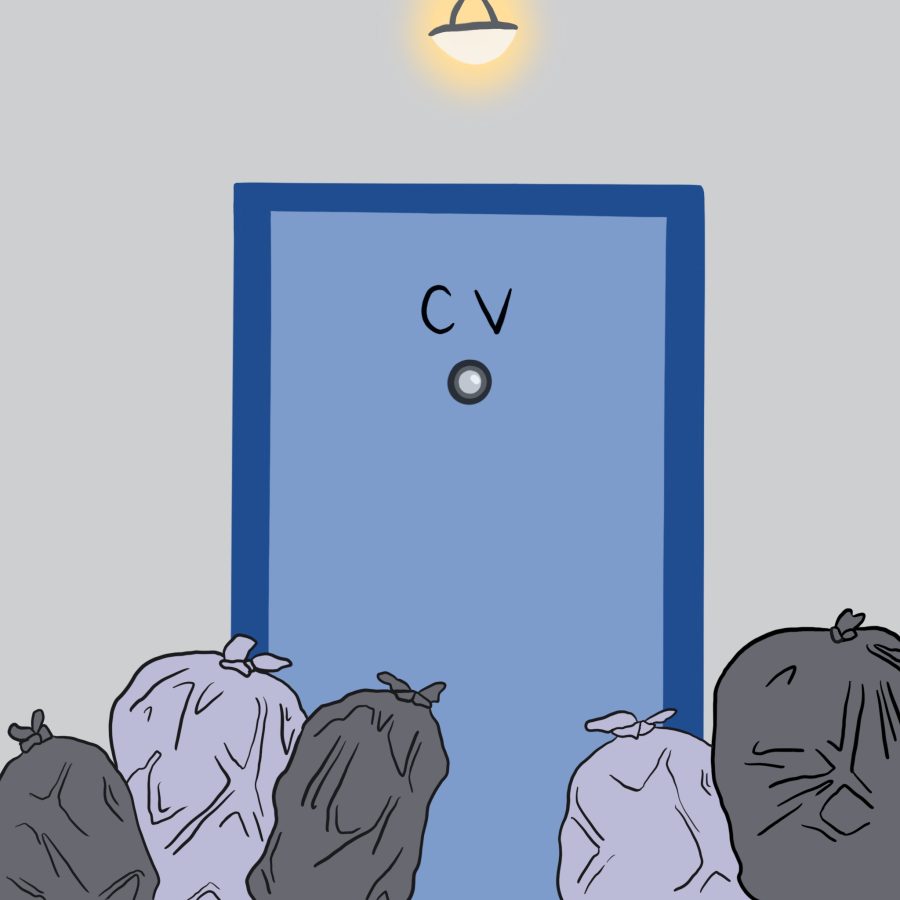City Vista’s recycling is a problem: How do we fix it?
Trinity University seemingly dedicates itself to making our campus more sustainable. From multiple dorm buildings being certified for having an environmentally-conscious design to using recycled water across campus, Trinity prides itself on centering sustainability initiatives. City Vista apartments, however, stand as a testament to our environmental blind spots.
The trash disposal method in City Vista is well-known to all who live there: trash is picked up from your door Monday, Wednesday and Friday evenings. You simply place your trash bin outside your front door the night before and it will be taken out of your hands. Recycling, however, remains more of an enigma. Cardboard boxes are picked up from doorsteps along with trash. As for the rest of it, there is a recycling dumpster behind the building where items can be deposited, but the dumpster is hard to locate and not well known. Most of our recycling, then, ends up right in the bins with our trash.
It is ironic that while Trinity puts so much care into other areas of campus, this significant source of waste is largely ignored. For recycling waste to even make it through the recycling process, it must be uncontaminated and sorted by type. When we put all of our recycling together or along with trashed material, that significantly increases the chance that those materials will end up in landfills or be incinerated with the rest of the trash.
These methods are not without consequence either, as many people know. Incinerating waste releases harmful greenhouse gasses and toxic materials into the air, which can be dangerous to those living nearby. Landfills, too, release their own share of greenhouse gasses and pollutants into the air. Failing to properly manage recycling can have long-term and disastrous consequences for the environment.
However, recycling is not a cure-all to climate change. In the state it exists in today, it might not do anything at all for the environment.
These problems are much bigger than Trinity University. As of 2022, only about 5% of disposed plastic waste was actually recycled. Recycling is an expensive process: it costs money to collect waste, sort it into recyclable materials and then actually in turn break down the waste to use the materials for future items. Specifically, with plastic, an overproduction of cheap plastics — often made of materials that can become toxic once melted down for reuse — significantly impairs our ability to recycle them.
Recycling is also a picky process. Any materials contaminated with food — including oil or residue from foods, such as in pizza boxes — cannot be recycled. Mixing paper and glass recycling can make both materials unusable as glass shards damage the paper fibers. The sheer variety of plastics produced that are mostly incompatible with each other makes it even harder to break down and reuse plastics. In the face of systemic recycling and environmental problems, sustainability seems impossible to achieve.
So should Trinity University abandon the smoke and mirrors of sustainability? Of course not.
Providing City Vista residents with methods of disposing of recycling materials — comparable to what students in the dorms can access — will allow for, at least, providing students with the opportunity to recycle. Having recycling bins on the floors or in apartments, rather than one dumpster behind the building, can remind students that recycling is an option. It increases the probability that paper and glass waste — even if not plastic — can be sent to the appropriate places and eventually reused.
Trinity can also invest in programs to raise awareness in the study body regarding what can and cannot be recycled. Already, through organizations such as Eco Allies and the Sustainability Residence Hall, Trinity students have opportunities to learn how to be more conscious about waste and how to dispose of it. Educating students about the importance of separating recyclables, or ensuring that nothing disposed of is contaminated by food, will help increase the efficiency of recycling even more. Recycling is not perfect, but it is not a lost cause; we simply need to invest in its future.

My name is Ashwini Vivek (she/her) and I am an Opinion Writer for the Trinitonian! I am a senior Neuroscience major from Dallas, and I'm also involved...

Hi guys! My name is Lily Zeng, and I am a sophomore from Memphis, TN majoring in Urban Studies with an interest in a Spanish major or minor. My favorite...



